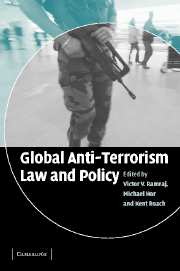Book contents
- Frontmatter
- Contents
- List of contributors
- Acknowledgements
- 1 Introduction
- PART ONE Theoretical Perspectives on Anti-Terrorism Law and Policy
- 2 Terrorism and the counter-terrorist discourse
- 3 The question of a generic definition of terrorism under general international law
- 4 The state of emergency in legal theory
- 5 Stability and flexibility: a Dicey business
- 6 Terrorism, risk perception and judicial review
- PART TWO A Comparative Study of Anti-Terrorism Measures
- PART THREE Anti-Terrorism Law and Policy in Asia
- PART FOUR Regional Cooperation
- PART FIVE Anti-Terrorism Law and Policy in the West
- PART SIX Anti-Terrorism Measures in Africa, the Middle East and Argentina
- Index
3 - The question of a generic definition of terrorism under general international law
Published online by Cambridge University Press: 21 July 2009
- Frontmatter
- Contents
- List of contributors
- Acknowledgements
- 1 Introduction
- PART ONE Theoretical Perspectives on Anti-Terrorism Law and Policy
- 2 Terrorism and the counter-terrorist discourse
- 3 The question of a generic definition of terrorism under general international law
- 4 The state of emergency in legal theory
- 5 Stability and flexibility: a Dicey business
- 6 Terrorism, risk perception and judicial review
- PART TWO A Comparative Study of Anti-Terrorism Measures
- PART THREE Anti-Terrorism Law and Policy in Asia
- PART FOUR Regional Cooperation
- PART FIVE Anti-Terrorism Law and Policy in the West
- PART SIX Anti-Terrorism Measures in Africa, the Middle East and Argentina
- Index
Summary
Treaty law and custom
Recent interest in the utility or propriety of a generic definition of terrorism has been driven by larger issues, such as the need to build international solidarity in the war against terrorism, and the opposing need felt by some of guarding any such possible definition of terrorism from any undue weightage likely to be given to the unilateral beliefs of any one state, and particularly the meaning likely to be or already given to that term in the foreign policy of any one state. Talk of the need to define terrorism comprehensively under international law cannot be divorced from such over-riding political concerns which, together with some old diplomatic obstacles, continue to plague the ongoing negotiations towards a Comprehensive Convention on Terrorism. The initiative for a comprehensive treaty definition of terrorism was a response to calls beginning in the 1990s for a departure from a regime of variegated subject-specific treaties which I shall discuss further below. The initiative had come originally from India, and negotiations are currently ongoing. United Nations General Assembly resolution 51/210 of 17 December 1996 had established an Ad Hoc Committee which, together with the United Nations' Sixth (Legal) Committee, is currently tasked with negotiations on the Draft Comprehensive Convention. I feel any success here would, however, be mainly symbolic. In this chapter I have chosen to take what I consider a more pragmatic approach than if I had chosen to focus on the status of the negotiations on the Draft Comprehensive Convention.
- Type
- Chapter
- Information
- Global Anti-Terrorism Law and Policy , pp. 37 - 64Publisher: Cambridge University PressPrint publication year: 2005
- 2
- Cited by



